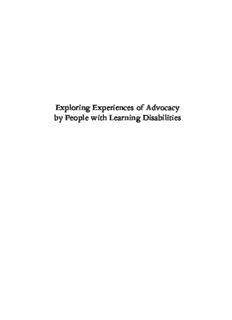Table Of ContentExploring Experiences of Advocacy
by People with Learning Disabilities
of relatedinterest
DeinstitutionalizationandPeoplewithIntellectualDisabilities
InandOutofInstitutions
EditedbyKelleyJohnsonandRannveigTraustadóttir
ISBN1843101017
WomenWithIntellectualDisabilities
FindingaPlaceintheWorld
EditedbyRannveigTraustadóttirandKelleyJohnson
ISBN1853028460
AdvocacyandLearningDisability
EditedbyBarryGrayandRobinJackson
ISBN1853029424
WorkingwithPeoplewithLearningDisabilities
TheoryandPractice
DavidThomasandHonorWoods
ISBN1853029734
PersonCentredPlanningandCareManagementwithPeople
withLearningDisabilities
EditedbyPaulCambridgeandStevenCarnaby
ISBN1843101319
HelpingPeoplewithaLearningDisabilityExploreChoice
EveandNeilJackson
IllustratedbyTimBaker
ISBN1853026948
InclusiveResearchwithPeoplewithLearningDisabilities
Past,PresentandFutures
JanWalmsleyandKelleyJohnson
ISBN184310061pb
QualityofLifeandDisability
AnApproachforCommunityPractitioners
IvanBrownandRoyI.Brown
ForewordbyAnnandRudTurnbull
ISBN1843100053
GuidetoMentalHealthforFamiliesandCarersofPeople
withIntellectualDisabilities
GeraldinHolt,AnastasisGratsa,NickBouras,TeresaJoyce,MaryJaneSpiller
andSteveHardy
ISBN1843102773
Exploring Experiences
of Advocacy by People
with Learning Disabilities
Testimonies of Resistance
Edited by Duncan Mitchell,
Rannveig Traustadóttir, Rohhss Chapman,
Louise Townson, Nigel Ingham and Sue Ledger
Jessica Kingsley Publishers
London and Philadelphia
TheeulogyforRoyLoomisbyShirleyDeaninChapter2isreproduced
bypermissionofShirleyDean.
Firstpublishedin2006
byJessicaKingsleyPublishers
116PentonvilleRoad
LondonN19JB,UK
and
400MarketStreet,Suite400
Philadelphia,PA19106,USA
www.jkp.com
Copyright©JessicaKingsleyPublishers2006
Therightofthecontributorstobeidentifiedasauthorsof thisworkhasbeenasserted
bytheminaccordancewiththeCopyright,DesignsandPatentsAct1988.
Allrightsreserved.Nopartof thispublicationmaybereproducedinanymaterialform
(includingphotocopyingorstoringitinanymediumbyelectronicmeansandwhether
ornottransientlyorincidentallytosomeotheruseof thispublication)withoutthe
writtenpermissionofthecopyrightownerexceptinaccordancewiththeprovisionsof
theCopyright,DesignsandPatentsAct1988orunderthetermsofalicenceissuedby
theCopyrightLicensingAgencyLtd,90TottenhamCourtRoad,London,England
W1T4LP.Applicationsforthecopyrightowner’swrittenpermissiontoreproduceany
partofthispublicationshouldbeaddressedtothepublisher.
Warning:Thedoingofanunauthorisedactinrelationtoacopyrightworkmayresult
inbothacivilclaimfordamagesandcriminalprosecution.
LibraryofCongressCataloginginPublicationData
ACIPcatalogrecordforthisbookisavailablefromtheLibraryofCongress
BritishLibraryCataloguinginPublicationData
ACIPcataloguerecordforthisbookisavailablefromtheBritishLibrary
ISBN-13:9781843103592
ISBN-10:1843103591
ISBNpdfeBook:1846425115
PrintedandboundinGreatBritainby
AthenaeumPress,Gateshead,TyneandWear
Contents
1. Introduction 7
DuncanMitchell,ManchesterMetropolitanUniversity,UK
Part I: Personal Accounts of Advocacy and Resistance 11
2. AdvocacyasResistance:SpeakingUpasaWayof FightingBack 13
DorothyAtkinson,TheOpenUniversity,UK,MabelCooperandGloriaFerris,
LondonConsultativeGroup,UK
3. RestrictionandResistance:TheExperienceof LifeonaLocked
WardforPeoplewithLearningDisabilities 20
KatherineOwen,TheOpenUniversity,UK
4. ‘IWouldNeverWalk,Talk,SitorStand!’TheGirlontheTricycle 27
MarjorieChappell,independentwriterandspeaker,withDuncanMitchell
5. TwoPioneersof Self-advocacy:RayLoomisandTomHoulihan 37
PaulWilliams,UniversityofReading,UK
6. ‘I’veHadEnoughof theEverydayThing’:KarenSpencer’s
LifeStory 42
KarenSpencer,CentralEnglandPeopleFirst,UK,withJanWalmsley,
TheOpenUniversity,UK
7. ResilienceandResistanceintheLifeHistoriesof ThreeWomen
withLearningDifficultiesinIceland 54
GudrúnStefánsdóttir,IcelandUniversityofEducation,andRannveig
Traustadóttir,UniversityofIceland,Reykjavik
8. Songsof Resistance 68
SueLedger,TheOpenUniversity,UK,andLindyShufflebotham,YarrowHousing,UK
Part II: Speaking for Ourselves: Accounts of Self-advocacy
in Action 91
9. MyLife,MyChoices 93
PaulSavage,TinaWilkinsonandCarlWorth,SpeakingUpforAction,UK
10. ‘WhatTheyWant–Yes,ButWhatWeWant–BuggerUs!’ 100
AndyDocherty,ElizabethHarkness,MalcolmEardley,LouiseTownson,
andRohhssChapman,CarlislePeopleFirst,UK
11. TheLifeof aGroupandaPersonalStory:Experiencesfrom
HuddersfieldPeopleFirst 108
JeremyHoy,DriesCautrelsandDanGoodley,UniversityofSheffield,UK,
withHuddersfieldPeopleFirst,UK
Part III: Alliances with Others 117
12. FiresBurning:Advocacy,CampingandChildrenwithLearning
DisabilitiesinOntario,1950–1990 119
JessaChupik,McMasterUniversity,Ontario,Canada
13. ResistanceinMencap’sHistory 128
LizTilley,TheOpenUniversity,UK
14. OneMan’sDreamthatContinuestoInspireOthers 142
HeatherCadbury,TeddingtonAreaReminiscenceGroup,UK
15. MaureenOswinandthe‘ForgottenChildren’of theLong-stay
Wards:ResearchasResistance 153
SheenaRolphandDorothyAtkinson,TheOpenUniversity,UK
16. ResistanceandControl:MutiniesatBrentry 172
PeterCarpenter,BathandNorthEastSomersetPrimaryCareTrust,UK
17. TakingaStandAgainsttheOdds 179
KelleyJohnson,RMITUniversity,Melbourne,Australia
Part IV: Alternative Interpretations: Reflections on Resistance 189
18. AssistanceandResistance:MakingSenseof Inter-warCaring
Strategies 191
PamelaDale,UniversityofExeter,UK
19. StereotypedBehaviour:ResistancebyPeoplewithProfound
LearningDifficulties 202
MelanieNind,UniversityofSouthampton,UK
20. Conclusion 212
DuncanMitchell
THECONTRIBUTORS 216
SUBJECTINDEX 221
AUTHORINDEX 224
1
Introduction
Duncan Mitchell
Thisbookexploreswaysinwhichpeoplewithlearningdifficultieshavespoken
forthemselvesandresistedoppression.Byadoptinganapproachthatcombines
the accounts of people with learning disabilities, workers in learning disability
services and academics, the editors hope to promote debate about the way in
whichdifferentstakeholdersinservicesrelatetoeachother.Mostofthechapters
are drawn from experiences in the UK but accounts from Australia, Canada,
IcelandandtheUSAbroadenthebook’sperspective,giving itaninternational
flavour.
‘Testimoniesofresistance’formsthethemeofthebook.Thisispartlydueto
thenatureofthestories,whichgiveexamplesofstruggleagainstprevailingideas
andpractices.Itisalsoaclearattempttohighlighttheworknecessaryifpeople
withlearningdisabilitiesaretocontinuetodevelopwaysofdirectingtheirown
lives and playing a full part in their communities. The editors also wanted to
encourage the contributors to consider the positive part they have played in
changing services. They present to the reader an active and assertive group of
peoplethatcountersthepassiveimageofpeoplewithlearningdisabilitiesthatis
sooftenportrayed.
Asaseriesofpersonalaccountscombinedwithsomeacademicreflectionon
thesubjectoflearningdisabilities,thebookaddstotheliteratureoflifehistory,
biographyandexperienceoflearningdifficulty.Init,aperiodofcontemporary
history is charted in which people with learning difficulties have increasingly
begun tospeak forthemselves.Thecontribution of families,carersand profes-
sionals in supporting change is also recognized, as is thefactthat, while many
oppressedgroupshavespokenforthemselvesformanyyearsandhencebeenable
7
8 / EXPLORINGEXPERIENCESOFADVOCACY
toinfluenceothersandshapepolicy,peoplewithlearningdifficultieshavehad
lessopportunitytodothis.
Theorigins of thisbook areintheworkof theSocialHistoryof Learning
DisabilityGroupbasedattheOpenUniversity.Thisgroupbringstogetheraca-
demics,peoplewithlearningdisabilities,serviceprovidersandotherinterested
peopletoexplorethepastanditsinfluenceonthepresentandfuture.Thegroup
has addressed key issues in the history of learning disabilities and has been
widelyacclaimedforitsapproachofworkingwithpeoplewithlearningdisabili-
tiesandintegratingthestoriesofdifferentindividualswithvaryingbackgrounds.
Thegroup’sconferenceshaveprovidedaforuminwhichtheeditorshavemetto
drawtogethertheirwork.Unsurprisinglygiventheemphasisoftheconferences
mostofthepublishedworkhasexplicitlybeenrelatedtothehistoryoflearning
disability.However,someofthepaperspresentedattheconferenceshavetakena
morecontemporaryapproachtothesubject.Thisislikelytohavebeenfortwo
reasons.Inthefirstplace,whenpeopleareencouragedtotelltheirlifestoriesitis
inevitablethatsomewilladdressaveryrecentperiod.Thisisnotonlythecase
withpeopleintheirtwentiesandthirtiesbutalsomucholderpeoplewhohave
preferredtoreflectonthelasttenyearsoftheirliferatherthantheirexperienceof
previousdecades.Second,astheconferenceshavedevelopedtheyhavenaturally
movedtowardscoveringdifferentareasandwhilesomeofthethemeshavebeen
similartherehasbeenlessemphasisontheexperienceoflargeinstitutionsandfar
moreonlifewithinordinarycommunities.
Anumberofthepaperspresentedattheirconferencesformthebasisofthis
book.Theauthorsseektoaddressthekeyissuesofadvocacyandself-advocacyin
contemporaryservicesbypresentingpersonalstoriesofthewayinwhichpeople
with learning disabilities and their supporters have resisted poor services,
damagingattitudesandoppressivepractice.Severalissueshavebeenraisedinthe
conferencesthatarepertinenttocurrentpolicyandpracticeinlearningdisability
services. Prominent among these is the relationships between disabled and
non-disabledpeople.Thereareexamplesofcomplexnegotiationbetweenpeople
withlearningdifficultiesandstaffpaidtoworkwiththem,theirfamilies,friends
and volunteer workers. Questions regarding the nature of employment and
power are exposed within some stories as people have had to wrestle with
dilemmasaboutwhethertoemployhelp,acceptitfrompeoplealreadyemployed
orfromvolunteers.
Thefoursectionsofthisbookstartwiththepersonalstoriesbeforemoving
togroupaccounts,thenallianceswithothersandendingwithaseriesofreflec-
tions and interpretations of resistance within learning disability services. Part I
INTRODUCTION / 9
containspersonalaccountsofadvocacyandresistanceincludingabiographyof
RayLoomisandTomHoulihan,twopioneersofself-advocacy.Thediscussionby
GudrúnStefánsdóttirandRannveigTraustadóttirinChapter7oftheexperiences
of women with learning disabilities in Iceland also provides an international
flavour.InChapter8SueLedgerandLindyShufflebothamexamineaselectionof
songsofresistancefromanumberofinstitutionsforpeoplewithlearningdisabil-
ities in the UK; these demonstrate both resistance and the resilience of people
living inlong-stayinstitutionsandtheauthorssuggestlinksbetweentheresis-
tanceof peoplewithlearningdisabilitiesandthatof othersocialgroups.
Part II, ‘Speaking for Ourselves: Accounts of Self-advocacy in Action’,
containsthreechaptersthatreflectonthewaythatself-advocacyisdevelopingby
givingspecificaccountsofself-advocacyinaction.Startingwiththeaccountby
PaulSavage,TinaWilkinsonandCarlWorthof thewayinwhichtheSheffield
SpeakingUpForActionGroup(SUFA)begananddevelopedfromaninitialidea
tobecomingamatureorganizationemployingitsowndevelopmentworker,Part
IIcontainsaccountsofseveraldifferentself-advocacyorganizations.Represent-
ing areas within England as far apart as Carlisle and Southend, the accounts
presentapictureof bothsimilaritiesanddifferencesof self-advocacyinaction.
PartIII,‘AllianceswithOthers’,containssixaccounts.JessaChupikdescribes
aparents’groupthatgrewfromasmallgroupofparentsinTorontotooneofthe
largest and influential learning disability pressure groups in Canada. Elizabeth
Tilley analyses the role of resistance within Mencap (a large British interest
group),aswellastheexternalactivitiesofthegroupitself.Chapters14and15
arebiographiesof peoplewhohaveworkedinthefieldof learningdisabilities,
andfinally,KelleyJohnsonoffersobservationsonthewayinwhichsomewomen
inAustraliahavetakenastandagainstthesystemsthathavetriedtomanagetheir
lives.
PartIVtakesamorereflectiveviewofadvocacyandisdesignedtoprovoke
thoughtaboutdifferentwaysoflookingatthesubject.PamelaDalere-examines
caring strategies of the past by considering how people have been able to live
within oppressive systems by conforming or resisting. Melanie Nind asks
whetherpeoplewithprofoundlearningdifficultiesusebehavioursthatareoften
seen as meaningless or harmful to gain some control and to resist unwelcome
demandsandsituations.
Theuseoflanguagehasbeen,andremains,hugelyimportanttopeoplewith
learningdisabilitiesandisanongoingpoliticalissue.Termssuchas‘mentaldefi-
ciency’,‘subnormality’and‘mentalhandicap’havebeenusedwidelyinthepast.
Languagenotonlydescribescontemporaryviewsandconceptsofdifferencebut
10 / EXPLORINGEXPERIENCESOFADVOCACY
alsocontributestoitsdevelopment.Thedilemmaforthoseof uswritingabout
thepastiswhethertouselanguagefromtheperiodbeingdiscussedorwhetherto
adoptcurrentterminologytoavoidoffenceandtohelpfosterapositiveimageof
peoplewithlearningdisabilities.Thecompromiseisgenerallytoavoidconfusion
byusinglanguagefromthepastindirectquotations,andwhenabsolutelyneces-
saryforclarity,andtousemodernlanguageatallothertimes.Thisguidedoesnot
helpwiththecurrentdebateaboutwhethertousetheterm‘learningdifficulty’,a
term that is preferred by many people with learning difficulties in the UK, or
‘learningdisability’whichhasbecomethepreferredtermoftheUKGovernment
and is widely used within services. The editors have avoided having to choose
betweentheseoptionsbyleavingittotheauthorsofeachchaptertodecide.Asa
result both terms appear in this volume. International comparisons further
confusetheuseofterminologyanditmaythereforebehelpfultopointoutthat
theuseoftheterms‘learningdifficulties’and‘learningdisabilities’intheUKis
similar to theuse of ‘intellectual disabilities’ and ‘developmental disabilities’ in
othercountries.
Manypeoplewhohavebeenlabelledashavinglearningdisabilitieshavenot
beenabletoleadordinarylives.Thisisbecauseoftheviewsofpeoplewhohave
had thepowerto determine wherepeople withlearning disabilities live. Many
peoplewithlearningdisabilitieshaveresistedtheviewsofothersbystrugglingto
leadordinarylives.OnesuchpersonisMaryCoventry,whotestifiedtoherown
resistanceataconferenceattheOpenUniversityin2001andwantedherstoryto
beincludedinthisbook.
I would like to talk about my work, hobbies and interests and my various
achievements.IfeelthatIhaveworkedhardandachievedalotinthelastfew
years.Ilivedathomewithmyfamilyfirstofall,butnowIlivemoreorless
independentlyinagrouphome.IworkatthePeopleFirstofficeinCroydon
onceafortnightonTuesdays,andIgotoMencapmeetingsinLondonwith
PeopleFirst.Ienjoywritingpoetry,andmyotherhobbiesandinterestsare
varied. They are knitting, crochet, tapestry, embroidery and collecting
models and pictures of owls. I am interested in oasthouses, windmills and
watermillsandIamknowledgeableaboutthingslikeflowersandplantsand
thedifferentspeciesofowls.Ihavebeenonlotsofdifferentcollegecourses
overtheyears.TheseincludemathsandEnglish.Ihavelotsoffriendsanda
boyfriendcalledJohn.
Marywantedthisstorytostandasitis,withoutexpansionorfurtherdetail.For
Mary, as with many other people, this account illustrates the power of the
ordinary.Ironicallythefighttoliveordinaryliveshasledtoanumber of quite
extraordinarylifestories,someof whicharediscussedinthepagesthatfollow.
Description:"Exploring Experiences of Advocacy by People with Learning Disabilities" charts the course through which people with learning disabilities have become increasingly able to direct their own lives as fully active members of their communities. Accounts from the UK, Australia, Canada and Iceland conside

